Key takeaways:
- Home automation enhances comfort, security, and efficiency, allowing control over various home aspects remotely.
- Energy audits reveal areas for improvement, such as insulation and HVAC efficiency, leading to cost savings and increased home value.
- Technologies like smart thermostats, LED lighting, and smart power strips significantly contribute to energy efficiency and cost reduction.
- Regular maintenance and tracking energy usage can help identify savings opportunities and improve overall energy performance.
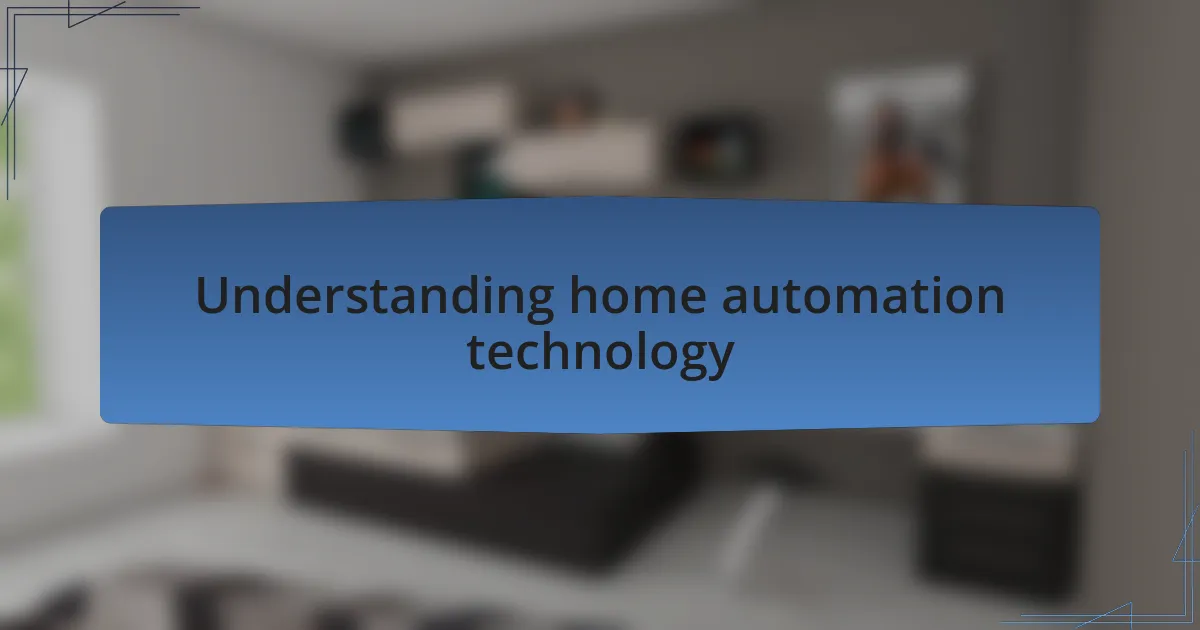
Understanding home automation technology
Home automation technology essentially refers to the system of interconnected devices that allows you to control various aspects of your home remotely or automatically. I remember the first time I set up my smart thermostat; it truly felt like I was stepping into the future, watching my home adjust its temperature based on my habits. Isn’t it fascinating to think that you can optimize your energy use just by programming devices that learn your daily routines?
At its core, home automation enhances comfort, security, and efficiency. I often find myself contemplating how much energy we waste every day on manual tasks. Take lighting, for example; having smart bulbs that adjust brightness based on the time of day not only creates an inviting atmosphere but also helps reduce energy costs. It really makes you wonder how much simpler life can be when you let technology handle the mundane.
Moreover, the beauty of home automation is that it is scalable; you can start with one device or go all in with a fully automated system. I remember upgrading my security system with smart cameras and realizing the peace of mind it offered. Doesn’t it make sense to invest in technology that not only simplifies your life but also makes it more secure and energy-efficient?
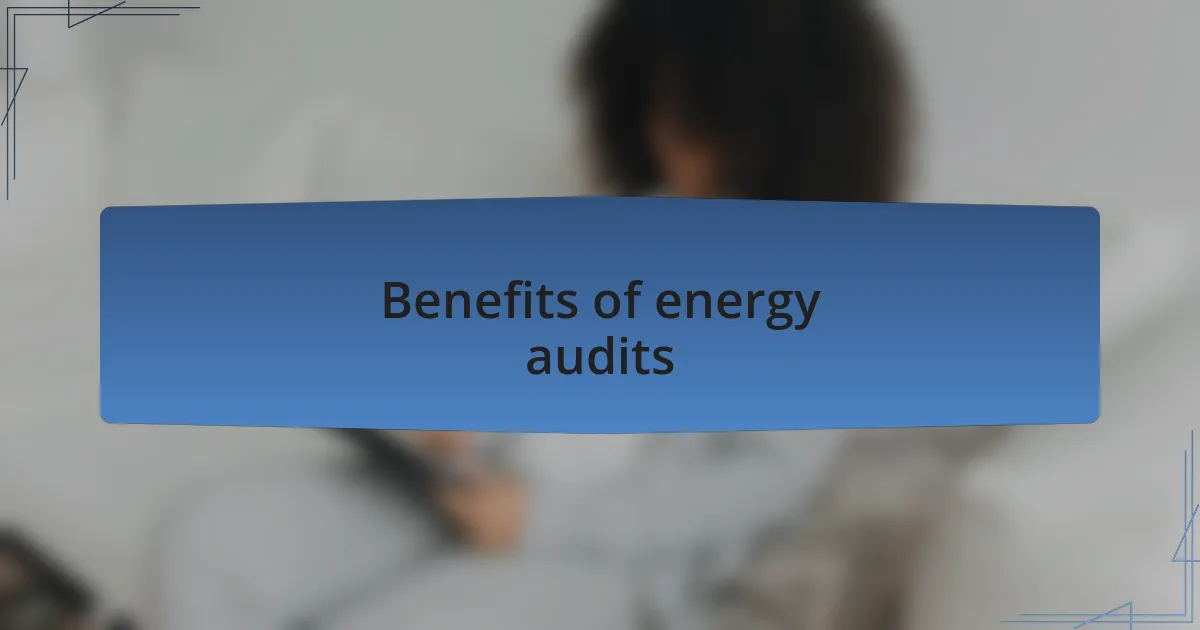
Benefits of energy audits
Energy audits can be a game changer for homeowners looking to reduce utility bills and enhance overall efficiency. I recall my first energy audit; the auditor highlighted areas where I was losing heat and wasting money. It felt like a revelation, realizing that minor fixes could lead to significant savings. Who wouldn’t want to keep more money in their pocket while making their home more comfortable?
The insights gained from an energy audit are invaluable, allowing you to prioritize improvements that will have the most impact. For instance, after implementing recommended changes, my home felt cozier, especially in winter, and I noticed a drop in my heating costs. It’s amazing how just a few adjustments—like sealing drafts or upgrading insulation—can transform a space. Wouldn’t it be rewarding to see those savings reflect in your next utility bill?
Moreover, conducting an energy audit can boost your home’s market value. I had a friend who pursued an energy-efficient upgrade post-audit, enriching her home’s appeal when selling. Potential buyers often seek homes that promise lower energy costs and increased sustainability. Isn’t it reassuring to think that enhancing your home’s energy performance can also improve your investment?
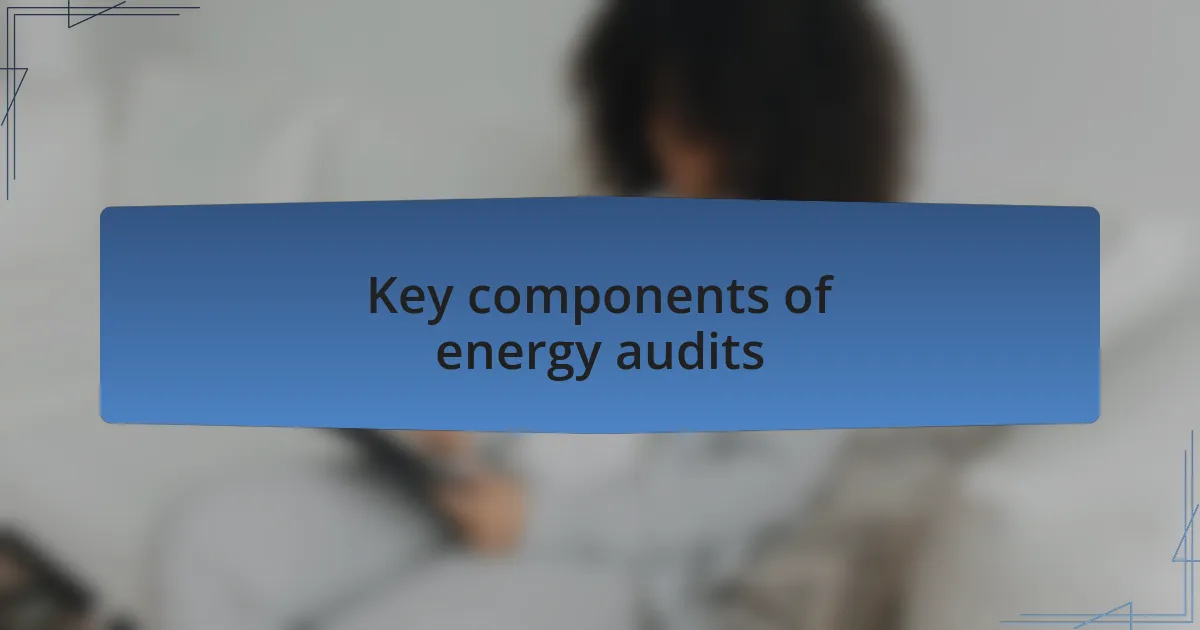
Key components of energy audits
When I think about energy audits, certain key components come to mind that are crucial for an effective assessment. One major aspect is assessing insulation levels throughout the home. I remember the eye-opener I had when an auditor pointed out that my attic insulation was far below the recommended level. It was like discovering a secret doorway to saving energy and money.
Another essential element is conducting a thorough analysis of your heating and cooling systems. I recall being surprised by how many homeowners overlook the efficiency of their HVAC units. During my audit, the professional tested my system’s performance, revealing that a simple cleaning could enhance efficiency and reduce my monthly bills. Isn’t it fascinating how a little attention can lead to a more comfortable living space?
Lastly, I can’t stress enough the importance of checking air leakage throughout the home. My experience with this component was transformative; sealing gaps and leaks not only made my home quieter but improved indoor air quality too. It’s incredible how small fixes can yield such significant benefits—don’t you just love that feeling of transforming your space into a more energy-efficient haven?
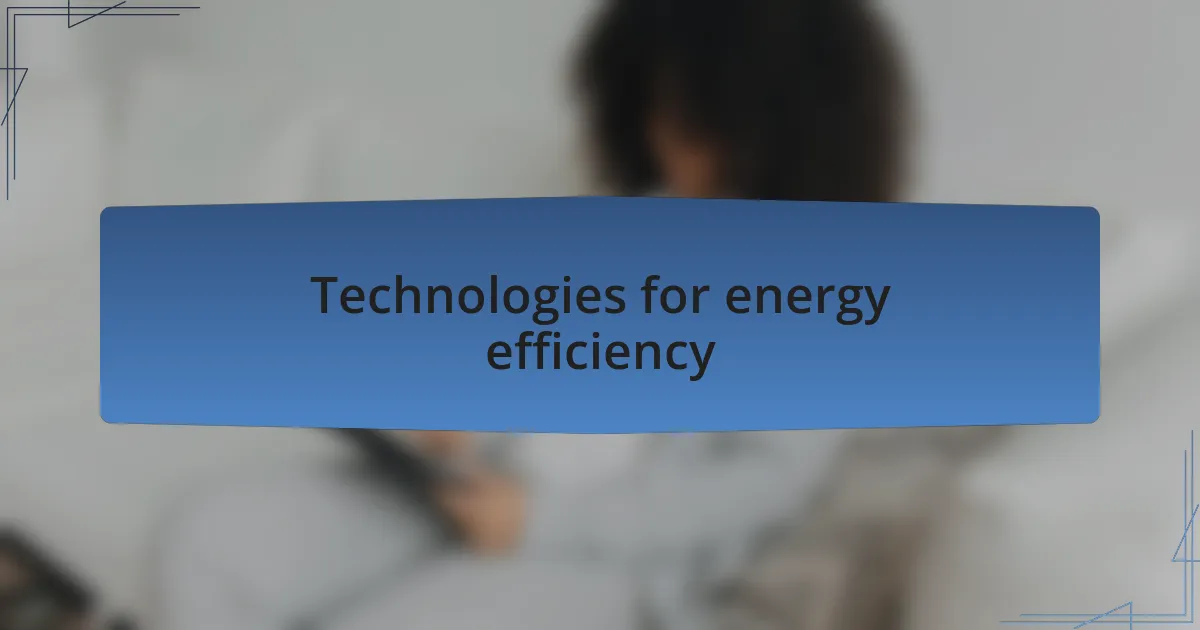
Technologies for energy efficiency
When I delve into technologies for energy efficiency, smart thermostats always come to mind. I remember the first time I installed one in my home; it learned my schedule and automatically adjusted the temperature, saving me not just energy but also a fair bit on my utility bill. How satisfying is it to feel in control of your energy usage without lifting a finger?
Another technology that feels like a game-changer is LED lighting. I was blown away when I switched out my old bulbs—suddenly, my spaces were brighter and more inviting. Plus, these energy-efficient bulbs consume a fraction of the energy compared to traditional incandescent bulbs, making it a small change that leads to bigger savings. Have you experienced the difference switching to LED makes in your home?
Finally, I’ve also found immense value in smart power strips. They’re fantastic for minimizing phantom energy use, which is the energy consumed by devices when they’re turned off but still plugged in. I implemented them in my home office, and it felt great knowing I was taking an extra step toward energy efficiency. Have you ever considered just how much those devices, when left plugged in, can add up over time?

Personal insights on automation
When I think about automation, I can’t help but reflect on the convenience of smart home devices. For example, I once came home after a long day to a perfectly lit living room, all controlled through my smartphone. It was a small luxury that made me feel like I had stepped into a cozy retreat rather than just another evening at home—doesn’t that sound appealing?
Another aspect I’ve found fascinating is how these automated systems can adapt over time. I recall being surprised by how my smart thermostat not only learned my preferences but also adjusted itself throughout the year, becoming even more efficient as the seasons changed. It caught me off guard how much I relied on this technology, transforming my home into an effortless haven without my constant input. Have you ever noticed how much we can rely on our homes to know what we need?
Moreover, I’ve experienced firsthand how automation can simplify everyday tasks. Recently, I set up a smart assistant that controls everything from my lights to my coffee maker, allowing me to start my day on the right note. It’s almost like having a personal assistant, one that gets my routine and helps streamline my mornings. Isn’t it incredible how these technologies can not only save energy but also create little moments of joy in our daily lives?
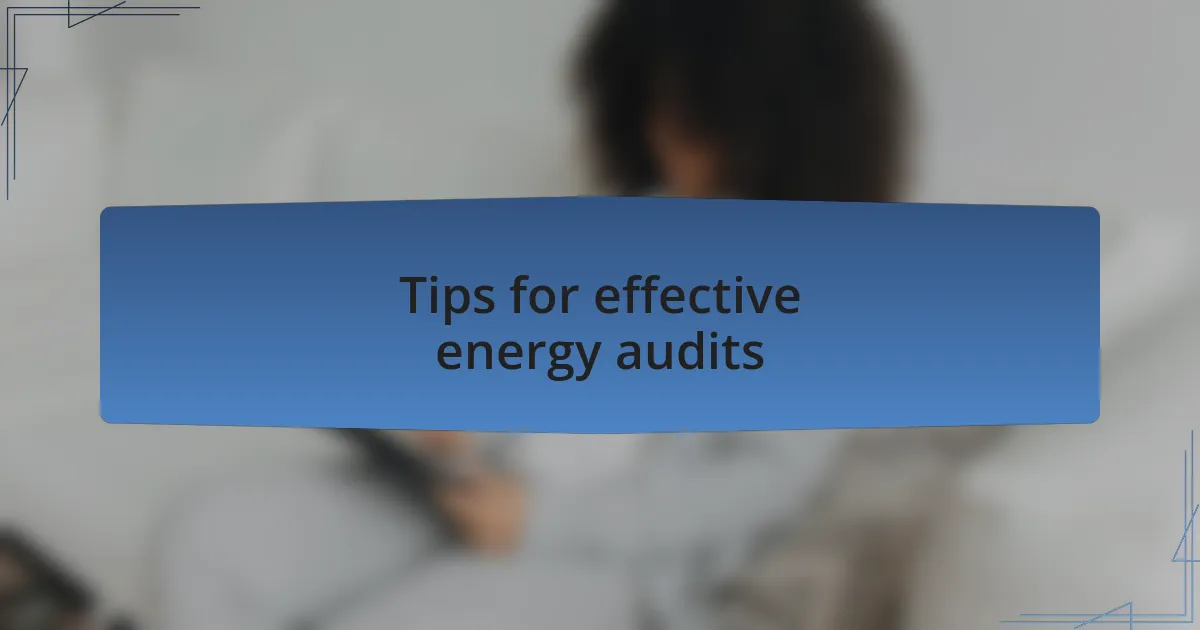
Tips for effective energy audits
When conducting an energy audit, it’s essential to collect data on your home’s energy usage manually. I remember painstakingly tracking my electricity bills over a few months, noting down patterns and identifying spikes during certain times. This exercise not only informed me about my consumption habits but also highlighted areas where I could make significant changes, like upgrading my insulation.
Paying attention to smaller details can yield surprising results. I once found that my old refrigerator was a major energy suck; replacing it with an energy-efficient model saved me not just on the bill but also brought peace of mind. Have you ever thought about how the appliances you use daily impact your overall energy footprint? It’s a thought that resonates every time I open my new fridge.
Finally, don’t overlook the importance of preventive maintenance. I learned this the hard way when a simple HVAC filter change made my system run incredibly smoother, improving its efficiency. Regular check-ups not only keep your energy expenses in check but also prolong the lifespan of your equipment. Isn’t it reassuring to know that some of the most effective solutions are often the simplest ones?